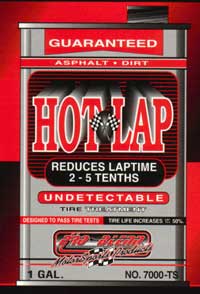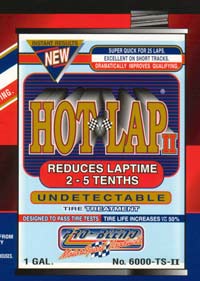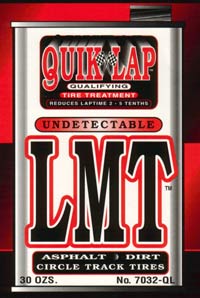INSIDE
RACING
T E C H N O L O G Y
IRT Home
IRT Home
News Page
Contents Page
Newsletter &
Books
email Paul
Tire Treatments
In the summer of '98 a tire treatment flap broke out in Winston Cup. This is my account of it. I wrote about it in the October '98 issue of my newsletter, TV MOTORSPORTS, and also the December '98 issue of Racecar Engineering magazine.
Jack Roush Says Rainbow Warriors Are Cheaters
Racing is extremely complicated and every serious participant constantly bumps up against the rules. In professional racing there are bright, hardworking people in every team thinking about how to make the cars faster but only a few people enforcing the rules. None of us wants to admit we get beaten because someone else is smarter or working harder so, when any single race team dominates a series, competing teams automatically think they're cheating. Sometimes cheating accusations are made openly as happened after Jeff Gordon's NASCAR Winston Cup win in September at Loudon, New Hampshire. This was the ninth time this year that Gordon and his Dupont-sponsored Rainbow Warriors have won and the fourth in the last five races.
Jack Roush, owner of five Winston Cup race teams including the team fielding a car for perennial second-place driver Mark Martin, accused Gordon's crew chief, Ray Evernham, of using performance-enhancing chemicals on the tires. NASCAR impounded tires from Gordon's race-winning car and those from the car of second-place Mark Martin and sent them to an independent lab for testing.
Gordon started the Loudon race from the pole position, but then he got hung up in the unforgiving outside groove and fell back to 17th. 100 laps into the race he had worked his way back into the top ten, but the car did not look like a race winner. Meanwhile Mark Martin had completely dominated the race and seemed headed for victory lane. A yellow flag on lap 233 brought most cars into the pits for fuel and tires. A few teams decided to improve track position by replacing only two tires. Ray Evernham made that call for Gordon's 24-car, and he beat Martin out on the track taking over the lead.
Mark Martin found himself yet again chasing the rainbow-colored number 24. Martin drove his car to the limit lap after lap--even brushing the wall exiting a corner--without gaining on Gordon. John Andretti seemed to be the fast car at the end of the race. He chased Martin down but didn't have enough speed to pass ending up third. "My car seemed to come to life with those two tires at the end," the winner, Gordon, said.
The Monday after the race the TV show RPM 2night on espn2 reported Roush said he had received a letter that claimed Gordon's team had bought chemicals marketed to enhance tire performance. Roush claimed Jeff Gordon's lap time decreased by 0.7 seconds after that two-tire pit stop, and he wondered how they could go faster on two fresh tires than everybody else with four. RPM 2night viewers watched a tape report showing Jack Roush yelling "Get out of here!" at Ray Evernham in the Loudon garage area after the race. Evernham's reply was, "I'm going. But I'll tell you what we're putting in the tires. It's air, Jack." At that point a Roush team member put his hand over the camera lens.
Evernham said during a TV interview a few days later that he would like to see that letter and know who wrote it. Evernham was irate and expressed his regret that a cheating accusation would tarnish the accomplishments of the team.
Tire Treatments Widely Available
I called a friend of mine, Ted James, and asked him about tire treatment chemicals. Ted and Nancy James started racing with a Lotus 67 Formula Ford in 1974 and have competed almost continually in various classes since. Ted designs, builds, and maintains their cars and Nancy drives them. She currently holds the SCCA D Sports Racing lap record at seven different tracks. An article I submitted to Racecar Engineering magazine describing the James' DSR and a similar racecar built and driven by Lutrell Harms will appear in a couple of months. [The article appeared in the March '99 issue of Racecar Engineering and is on this site at dsr1.htm.]
Ted knew all about tire treatments, "I use Hot Lap. It's
a clear, pinkish liquid that you put inside the tire and paint
in coats on the outside. You let it puddle inside the tire and
rotate it. It soaks right in. It's expensive stuff, maybe $150
a gallon, but it works. It softens the tire but not much. The
tire comes in quicker when it's cold and has more grip so it
doesn't slide as much. You can really lean on them right out
of the pits, and tire temperatures and pressures stay lower.
I don't think they make the car a lot faster, but you can use
the tires longer. I used to count heat cycles and throw the tires
away because they got too hard. Now we use the tires till the
cords show, and they work just as good the last lap as the first."
Ted also knew about the Roush/Evernham confrontation. "NASCAR
won't find anything," he said. "I think it just puts
stuff back in the tire that gases off as you use them. An analysis
won't find anything that isn't supposed to be there. You can't
smell it. Pro-Blend is the company that makes Hot Lap and several
other products including one you can spray into a mounted tire."
"I think this is what happens at a Cup race," Ted continued. "Goodyear mounts and inflates the tires with compressed air. Then the teams let that air out and replace it with dry nitrogen so the moisture in the compressed air doesn't add to the pressure when the tire gets hot. If I wanted to use it illegally I'd rig a dipper tube so the stuff sprayed in the tire with the nitrogen when the bottle was standing upright and not when it was lying down. That way you could treat the tires without letting anyone see what you're doing.
Hot Lap, Hot Lap II, and LMT
Ted gave me an 800 number for Pro-Blend Chemical Company in Winston-Salem, No. Carolina. I talked to a couple of people there, and they sent me some literature. They have more than 70 unique products for use by hard-core racers including lubricants and additives for cooling systems, transmissions, and engines.
The person I talked to at Pro-Blend knew about the Roush/Evernham face-off and didn't want to be quoted. He said their tire treatments are undetectable. The labels on the cans proclaim, "Designed to pass tire tests" and "Undetectable."
Pro-Blend said their tire treatments will lower lap times by a few tenths of a second on both pavement and dirt. The extra grip gives the driver another lane to race in and higher corner speeds. Since the tires are rolling and gripping, tire temperatures are lower and internal pressure won't build up as high. Higher cold tire pressures should be used to insure correct hot pressures. The racer gets more sessions out of a tire. The car is more drivable and, therefore, safer. The promoters like it. Fans like it. Drivers like it. Car owners like it. Well, maybe not Jack Roush!

Hot Lap is the original product. It claims to decrease lap times 2-5 tenths and increase tire life up to 50%. The racer applies Hot Lap by wiping the glaze off the tires with gasoline, scuffing with a wire brush, and painting 10 coats onto the outside of the tire. A 4-inch roller is recommended and it takes a few days for the total treatment. They say to apply 4 coats the first day waiting for 45 minutes between coats. Do the same thing the second day. The third day apply 2 coats and then wait three days before racing. They recommend applying 10 ounces inside each tire also.

Hot Lap II takes fewer coats and less time before the race. The label says "Super quick for 25 laps."

LMT is quick-acting and can be applied the day of the race. It's meant to be used for qualifying or during the first 25 laps of a race. If the racer can't get the tires until just before the session or the application of such chemicals is not allowed by the sanctioning body, LMT can be blown into the tire during inflation. LMT stands for Last Minute Treatment. I said I thought that was a provocative name. The guy at Pro-Blend replied, "It's meant to be."
Did the 24-Car Use This Stuff?
Obviously, I don't know. Frankly, it looked to me like Jeff Gordon wasn't any quicker after the 2-tire stop. He gained track position due to the shorter time in the pits and the adjustments they made to the car improved the handling. A couple of tenths at Loudon is a lot!
Ray Evernham did say they made air pressure adjustments in those two tires they put on during that late stop. Air pressure changes would have also been necessary, however, if Evernham DID use Hot Lap. Because of the better grip and less sliding, the tires would need higher cold pressures to insure correct pressures after the first few laps.
Evidently these tire treatments do work! These liquids are not just softeners. They are legal in many racing series, but not in NASCAR Winston Cup. I'd think that a team in the run for the Winston Cup championship just can't risk cheating. There is just too much money, too many sponsor relationships, and too many personal and professional reputations at stake. If NASCAR ever proves a team is using one of these products, I'd support banning them for life.
So why did Jack Roush make the accusation? I'm sure he was provoked by the letter he claimed to receive. He's obviously enormously frustrated. He owns a quarter-billion dollars worth of high-tech companies and five Winston Cup race teams, but the best he can do is finish second behind the 24-car. Mark Martin would be leading the Winston Cup championship points now if not for the brilliant performance of the Rainbow Warriors. I've also heard that Jack Roush is a real straight-arrow. [Since then I've heard conflicting opinions.] He doesn't break the rules, but he can't be sure about the other guys.
Here's what I think actually happened: A distributor or dealer of Pro-Blend products looking for new business sent a box of samples to some of the race teams. It's common practice to include a list of products and a list of current customers. Somebody saw Hot Lap on the product list and Hendrick Motorsports on the customer list. Jack Roush saw it, added two and two, and got 13.
They Win Again Anyway
Buoyed by a team wounded by the Loudon accusations, Jeff Gordon won his tenth race of the year and sixth out of seven at Darlington Raceway earning a million-dollar bonus. Mark Martin DNFd with an engine problem. NASCAR did not yet have test results from the tires they had confiscated at Loudon. At Darlington they confiscated tires randomly among the teams and initiated new procedures that limit a team's opportunity to alter their tires.
After the win at Darlington ESPN's Bill Weber asked Jeff Gordon,
"Did your team come here a little mad?"
"Absolutely," came the reply. "We certainly proved
something today...We're doing it fair and square...Ray was on
a mission."
By the next race at Richmond, Virginia, NASCAR had results from tests of the tires and found nothing unusual. The new tires rules will remain in place and teams will not be allowed to race on tires taken home to their shops. A Jack Roush car driven by Jeff Burton won the Richmond race narrowly over, who else, Jeff Gordon.
It looks to me like Jeff Gordon waits until his car is balanced
before he makes a move. Other guys overdrive the setup, and they
cook the right-rear tire when the car is loose and the right-front
when it's understeering. Gordon's feedback about the car and
Ray Evernham's experience and intelligence work together to dial
in the car near the end of the race. A smart, patient driver
coached by a knowledgeable, highly-motivated crew chief might
be the best tire treatment of all.
For more info on these products call Pro-Blend direct at 800-331-9520. Tell them you heard about their products on this web site.